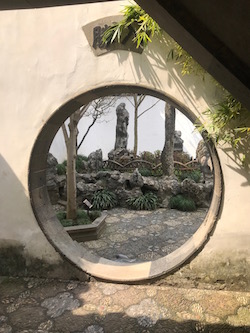Love
“Love takes off the masks that we fear we cannot live without and know we cannot live within. I use the word ‘love’ here not merely in the personal sense but as a state of being, or a state of grace - not in the infantile American sense of being made happy but in the tough and universal sense of quest and daring and growth.”
These words by James Baldwin, from The Fire Next Time. For nearly four or five years now, I’ve found a point mid-semester to bring the sentences into my freshman composition class. I read the quotation out loud, and my students write it down, their pens tracing each word. Then we look at the quote and they shout out words that they don’t know. “Grace?” And I admit that word trips me up too, then stumble through defining it. “Infantile?” Whether in classrooms in America or here in Shanghai, my students always seem to appreciate Baldwin’s dig at Americans. “He’s writing about race relations in the U.S. in the 60’s here, about his own vision for a way forward; this was when he still had lots of hope.”
Then I push us on, to the lesson: “What is the key term?” “Love,” they say, just off unison--it’s obvious. “We generally think of ‘love’ as what?” I pause. “And how does Baldwin help you re-see it?” They look at me, like they always do, their eyes searching. Most often I move on to get them to think about their own key terms, because there’s no point in talking about love this way with them. Whether on a personal level or a collective one, it’s an idea worth noting but useless to talk about, unless perhaps you’re Baldwin, and you have touched something so big, for so long, and your voice has stayed with so many.
But this time, in Shanghai, we stay with Baldwin’s words, and I say, “Do you think love should be ‘tough’? Is it something you should be daring for?” A few of them nod. “Really?” I ask. “Don’t you like the idea of ‘love’ being safe and making you happy?” Some shrug and murmur. Then one of them asks me, point blank, “Well, what do you think, Ms. Pierce?” The question is simple enough but it kicks me in the gut; deep breath: “It’s not about what I think it should be,” I say, “in my experience, it has been tough…and I’m talking about all kinds of love, loving my family, loving ideas, romantic love—yeah, it’s been really tough.” Why am I telling them this? “But grace is possible. And safety and happiness and joy are parts of it too. And this whole losing-your-mask thing? It suuuucks.” My eyes well up and I smile. “But so worth it! I swear.”
The day I taught Baldwin this semester happened to be the day that Lee--my boyfriend of just over a year, and a friend since our early twenties--was arriving in Shanghai. And I was terrified--ahem, excited. He is coming all across the world to spend two months with me! Just me! What if it’s a huge mistake? What if….? When he appeared on my doorstep, it wasn’t the glorious moment I’d wanted to imagine. And in those first hours and days the thing that I could feel most my resistance at giving up my (often) happy loneliness here, my awed alienation at being in China and not knowing anyone, and no one really knowing me. And since, in Lee’s month here in Shanghai, Love has been all the things: infantile, and mature, tough, and safe, American, and foreign, boring, and exciting, masking, and a revelation. And the sum of all of it, I suspect, is that we have been gaining, gradually, some sense of grace, together.
This semester's bittersweet end barely set, off we go now, my love and I, together for three weeks across parts of south and central China—a quest.



